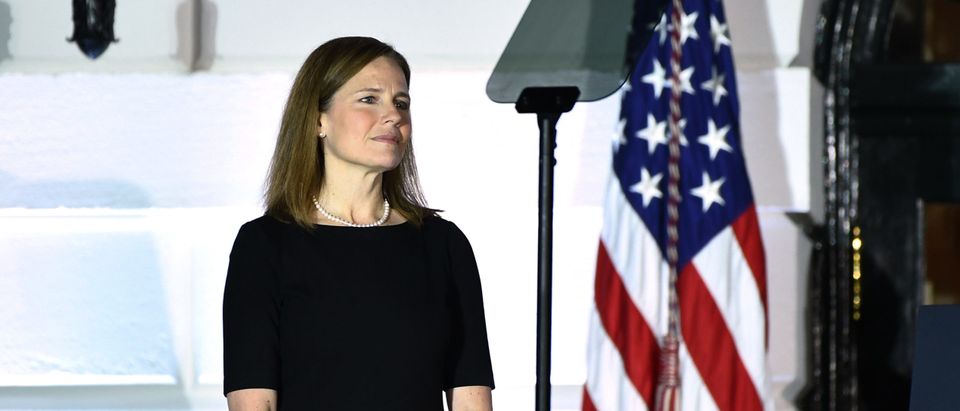Supreme Court Justice Amy Coney Barrett joined the majority in rejecting Friday Texas’ lawsuit which sought to block the certification of Electoral College votes.
The court ruled that Texas lacked standing under Article III of the Constitution and that Texas did not provide a “judicially cognizable interest in the manner in which another State conducts its elections.”
Conservative Justices Samuel Alito and Clarence Thomas dissented, noting they would grant the motion to file the complaint.
Here’s the Supreme Court’s order, with Thomas and Alito dissenting pic.twitter.com/9U4RgvYcSr
— Mark R. Levin (@marklevinshow) December 11, 2020
????????????????️BREAKING: Supreme Court REJECTS Texas’ push to overturn Biden’s election win.
Effort was backed by President Trump, 18 GOP state AGs and 126 House Republicans. pic.twitter.com/hcJ7APNdOF
— John Kruzel (@johnkruzel) December 11, 2020
During Barrett’s confirmation hearings, Democratic Connecticut Senator Richard Blumenthal said Barrett must recuse herself from any cases involving President Donald Trump and the outcome of the election, according to PBS. Blumenthal said Barrett’s participation would cause “explosive, enduring harm to the court’s legitimacy,” according to the report.
All 50 states have certified their election results and the Supreme Court rejected an emergency request from Pennsylvania Republicans to block the election results Tuesday.
However, Texas Attorney General Ken Paxton, in a bid supported by President Donald Trump and 17 other Republican-led states, asked the high court Tuesday for an emergency order to invalidate the ballots in the four battleground states of Georgia, Wisconsin, Michigan and Pennsylvania.
Trump filed a motion to intervene Wednesday, which is a request for him to join the lawsuit. (RELATED: ‘New California’ And ‘New Nevada’ File Brief In Support Of Texas-Led Lawsuit Seeking To Overturn Election Results)
The suit asked the court to block the certification of the Electoral College votes because the suit alleged that the four states had illegal votes. Paxton argued that pandemic-era changes in election procedures violated federal law.
“Using the COVID-19 pandemic as a justification, government officials in the defendant states of Georgia, Michigan and Wisconsin, and the Commonwealth of Pennsylvania, usurped their legislatures’ authority and unconstitutionally revised their state’s election statues,” the suit read.
Paxton said states used executive orders to change the election process and hurt voting integrity by not “protecting” signature verification and witness requirements.
The suit also alleged that the states didn’t segregate late ballots that would allow an “accurate analysis to determine which ballots were cast in conformity with the legislatively set rules and which were not.”
In October, the Supreme Court refused to expedite Pennsylvania Republicans’ challenge to a state Supreme Court ruling that allowed ballots to be received and counted as valid up to three days after the election even if they lacked a postmark because the high court was under the impression that Secretary of State Kathy Boockvar would order late ballots to be segregated.
Boockvar initially complied and issued guidance on Oct. 28 ordering all late ballots to be kept separate in case the Supreme Court ruled the extension unconstitutional.
However, she then updated the guidance last minute on Nov. 1, ordering all ballots that arrived before Nov. 6 to be counted as valid.
Supreme Court Justice Samuel Alito ordered Nov. 6 that all late ballots must be segregated despite Boockvar’s guidance.



